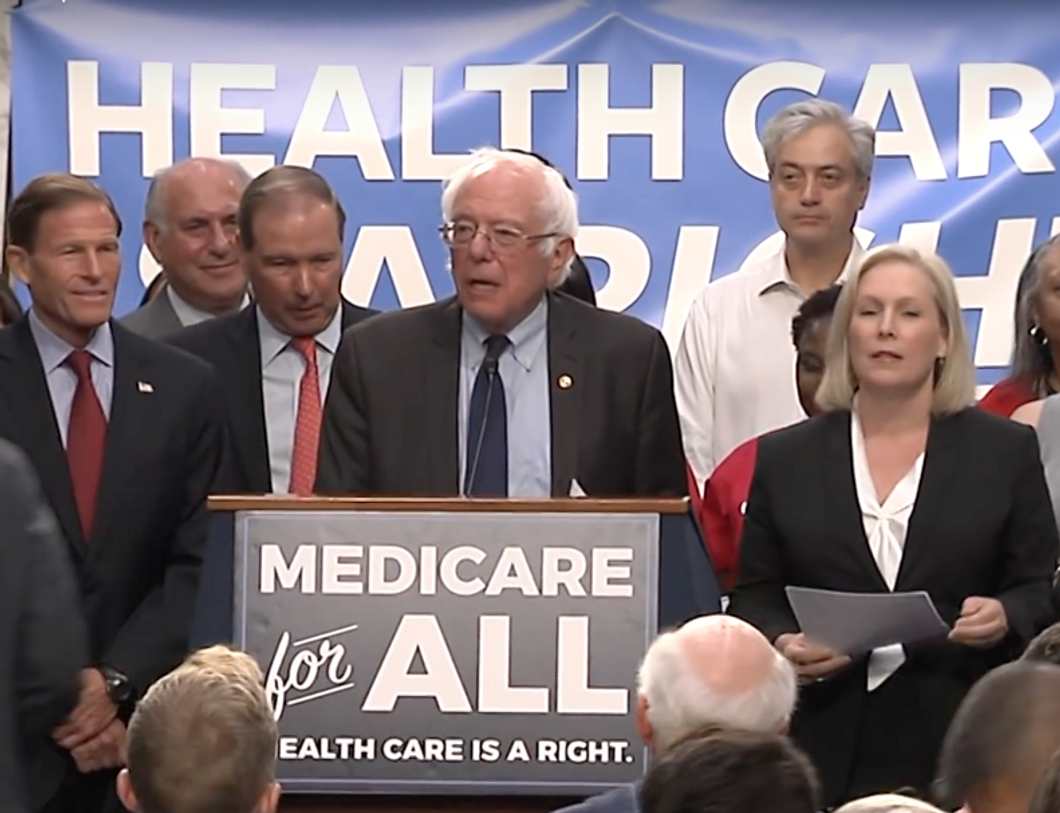It was at a Japanese restaurant at a hotel in Mexico where I changed my stance on single-payer healthcare. Since the 2016 election, I had been a big fan of Bernie Sanders and accordingly a supporter of his campaign, "Medicare for All." I thought single-payer would be an improvement from the current state of affairs.
But at the aforementioned restaurant, I started talking to my dad about healthcare policy and he laid out several objections to single payer, mentioning the failure of the VA system and the lack of incentives for efficiency that would result from a lack of competition. My sister, who wants to be a doctor, also pointed out that in single-payer systems, governments ration care, so the U.S. government would be able to limit how often my sister could see a doctor for her asthma, for example.
I realized at that moment that I had failed to really consider the negative consequences that a single payer system would have. After much deliberation, I concluded that the costs of single payer would outweigh the benefits. In all honesty, a public healthcare system may be a better policy.
In terms of political ideology, I am a liberal and a progressive. As a liberal, I wholeheartedly support government programs to help the poor and needy, but the idea of the government controlling the healthcare system and making people's healthcare decisions for them makes me deeply uncomfortable.
"Medicare for All" would be a drastic restructuring of the entire healthcare system which would reduce personal liberty and choice. Under the "Medicare for All" bills proposed in the Senate and the House, private insurance would be completely eliminated and so would the employer-based system we currently have.
The 30 million Americans who are currently uninsured would have health insurance, and there would be universal coverage; this is great. However, the majority of Americans (about 70%) would be forced to give up their current insurance for Medicare. And most Americans are happy with their insurance plan.
So while helping the uninsured, "Medicare for All" would take the tens of millions of Americans who get health insurance through their employer or via Medicare Advantage, completely off the health insurance plans they prefer. This would consequently be forcing government health insurance down their throats.
This flagrantly violates personal liberty. And while a democratic socialist may be fine with sacrificing personal liberty for the sake of big government, I am not.
An alternative policy, the public option, would allow the uninsured to have access to government insurance without disturbing the millions of Americans who have health insurance and like the plan they have. The public option, supported by Obama and initially included in Obamacare but killed by Sen. Joe Lieberman, was a good idea in 2009 and it's still a good idea a decade later. A public option would address many of the problems with our current system, provide several of the benefits of Medicare for All without the tremendous costs, and avoid the issues that have plagued single-payer systems.
I love Bernie, but his "Medicare for All" plan is deeply flawed. It's not just ambitious or idealistic; it's unrealistic and risky. It would be incredibly expensive and require massive tax increases, not just for the wealthy, but also for the middle class. Bernie's own home state of Vermont had to give up single-payer because such a policy would have a required a doubling of tax revenue.
No Democratic presidential nominee in recent decades has campaigned on raising middle-class taxes, so advocacy for this policy could be politically toxic for Democrats. While polls show that a majority of the American people support "Medicare for All", about half of Americans also believe that under Medicare for All, they could keep their current health plan— which is just plain wrong. In reality, we couldn't even guarantee that they would be able to keep their physician.
A public option, through either Medicare buy-in or a new program, would be "Medicare for Most", giving Americans a public health insurance plan alternative to private insurance plans. It would be easier to implement that Medicare for All and would increase competition and lower prices while expanding access to health insurance for millions of Americans.
Conservatives object to government intervention in health care because they want a "free market", but the health care market isn't free- it's a monopoly. In 2009 in my home state of Arkansas, the insurance company Blue Cross Blue Shield controlled 75% of the market. And unfortunately, under Obamacare, market consolidation has gotten worse, limiting choices for patients and making health care more expensive. A public option would break this monopoly, injecting some healthy competition.
Those on the public health insurance plan would still have to pay premiums, depending on their income. But these premiums would undoubtedly be lower because of lower administrative costs, the government's ability to negotiate with pharmaceutical companies and hospitals and the fact that the government, unlike private insurance, wouldn't be trying to make a profit.
Additionally, because people would be paying for care through premiums, there wouldn't need to be significant tax increases to pay for a public option. Even a new health program would likely combine Obamacare and Medicaid, redirecting existing federal funds. So the public option would be far cheaper than Medicare for All.
Democratic socialists argue that those who support a public option are neoliberal shrills, in the pockets of the health insurance industry. And while it is disturbing how many politicians in the Democratic establishment have taken money from health insurance companies, the view that the public option elevates the interests of health insurance companies over consumers is mistaken-quite the opposite in fact.
My stance on healthcare isn't just my own view- it is also the official stance of the Democratic Party. The policy of adding a public option to Obamacare was included as part of the 2016 Democratic Party Platform as a compromise, to appease both the Clinton camp and the Bernie camp and indeed it is a good policy for a big tent center-left party like the Democratic Party, whose membership includes centrists, democratic socialists, and everyone in between.
There's rhetoric from groups like the Justice Democrats that suggests that if you don't support Medicare for All, you aren't a true progressive- which I take issue with. As progressives, we believe that health care is a right and accordingly the government has a responsibility to ensure that all Americans have access to health care. But we can have reasonable disagreements about which policies would be the best to advance our goal of universal health care- and we should have a rigorous debate about this.
When it comes to health care policy, we don't need radical change (unlike in climate policy, where a Green New Deal is absolutely necessary to avert climate catastrophe). In health care, we need reform, not revolution. The American health care system is broken- but that doesn't mean we should burn it all down and try to build something new from the ashes; instead we should use the tools at our disposal to fix some flaws and add some new elements to make progress towards our goal of all Americans having access to quality, affordable healthcare.
Medicare for Those Who Need And/Or Want It. I concede it's not quite as catchy as Medicare for All. But it is, I believe, the right policy.
















